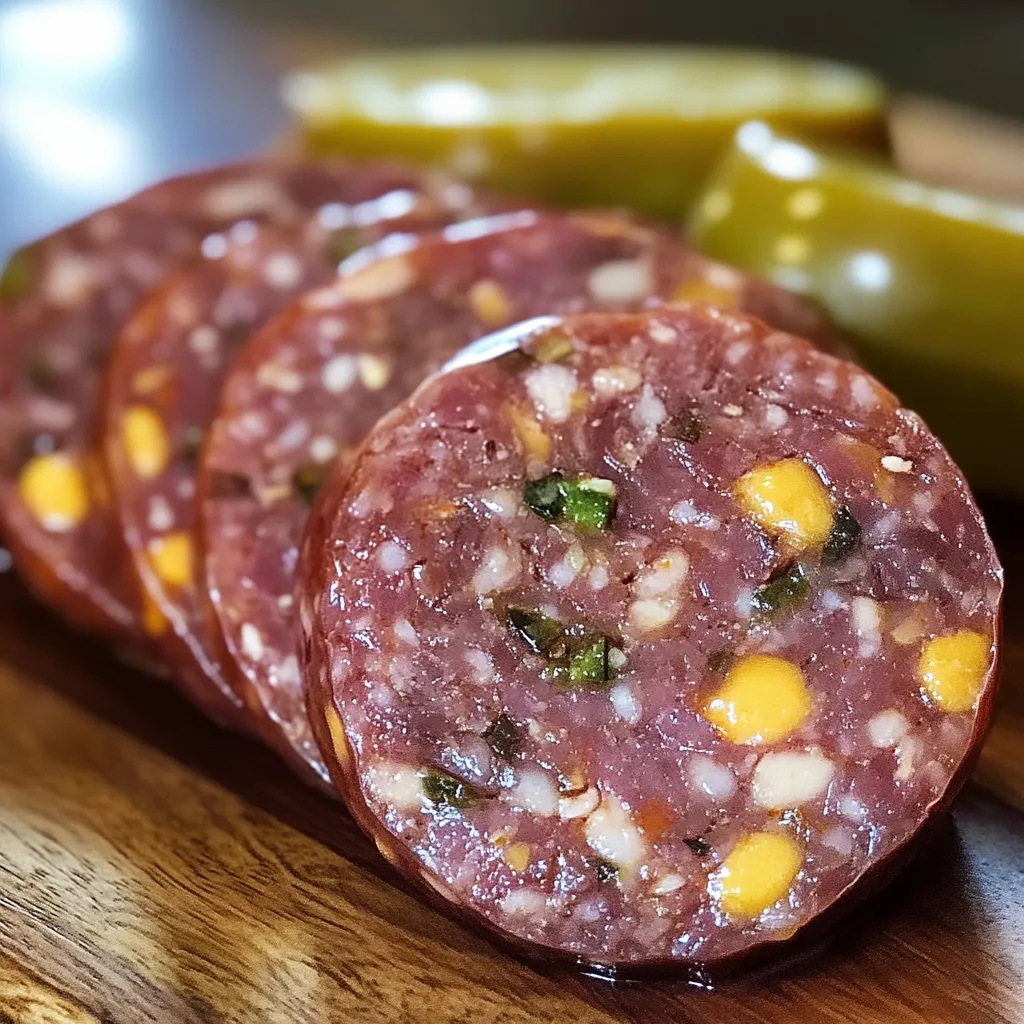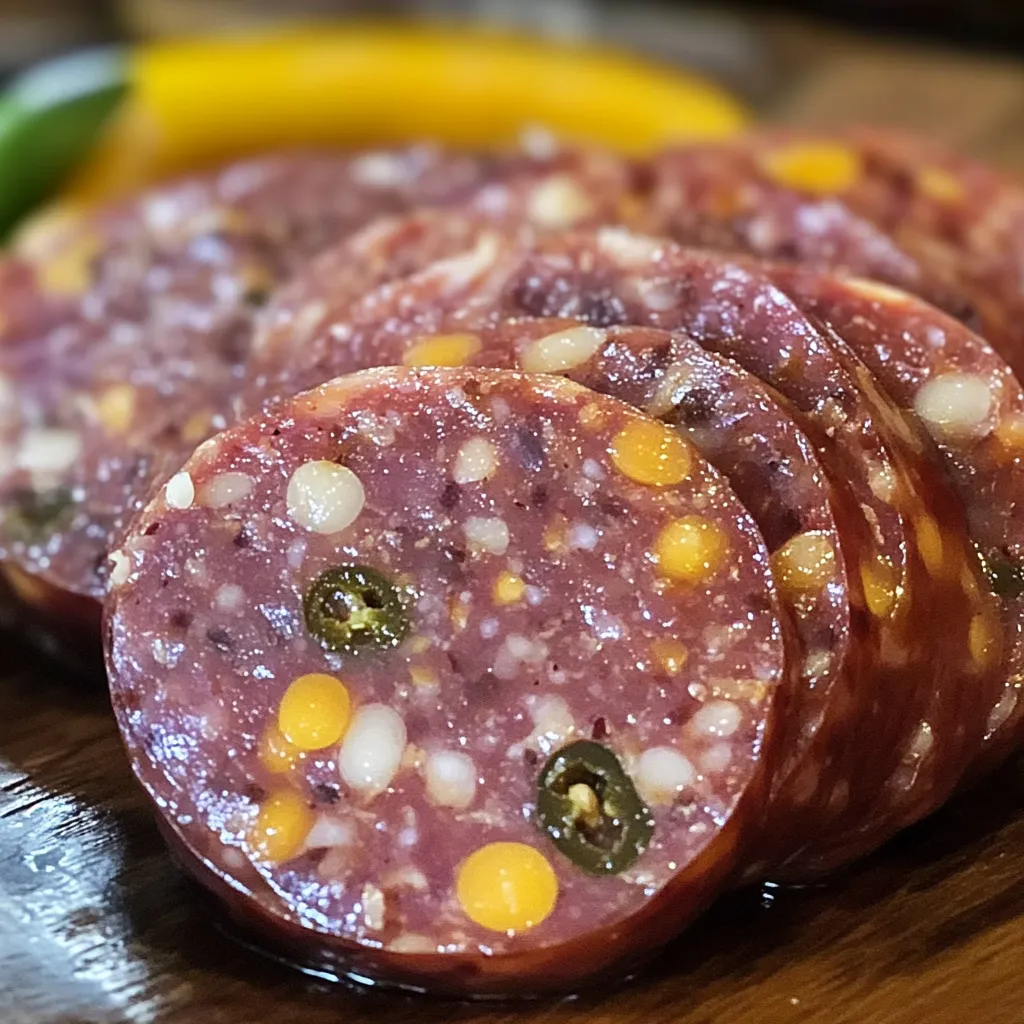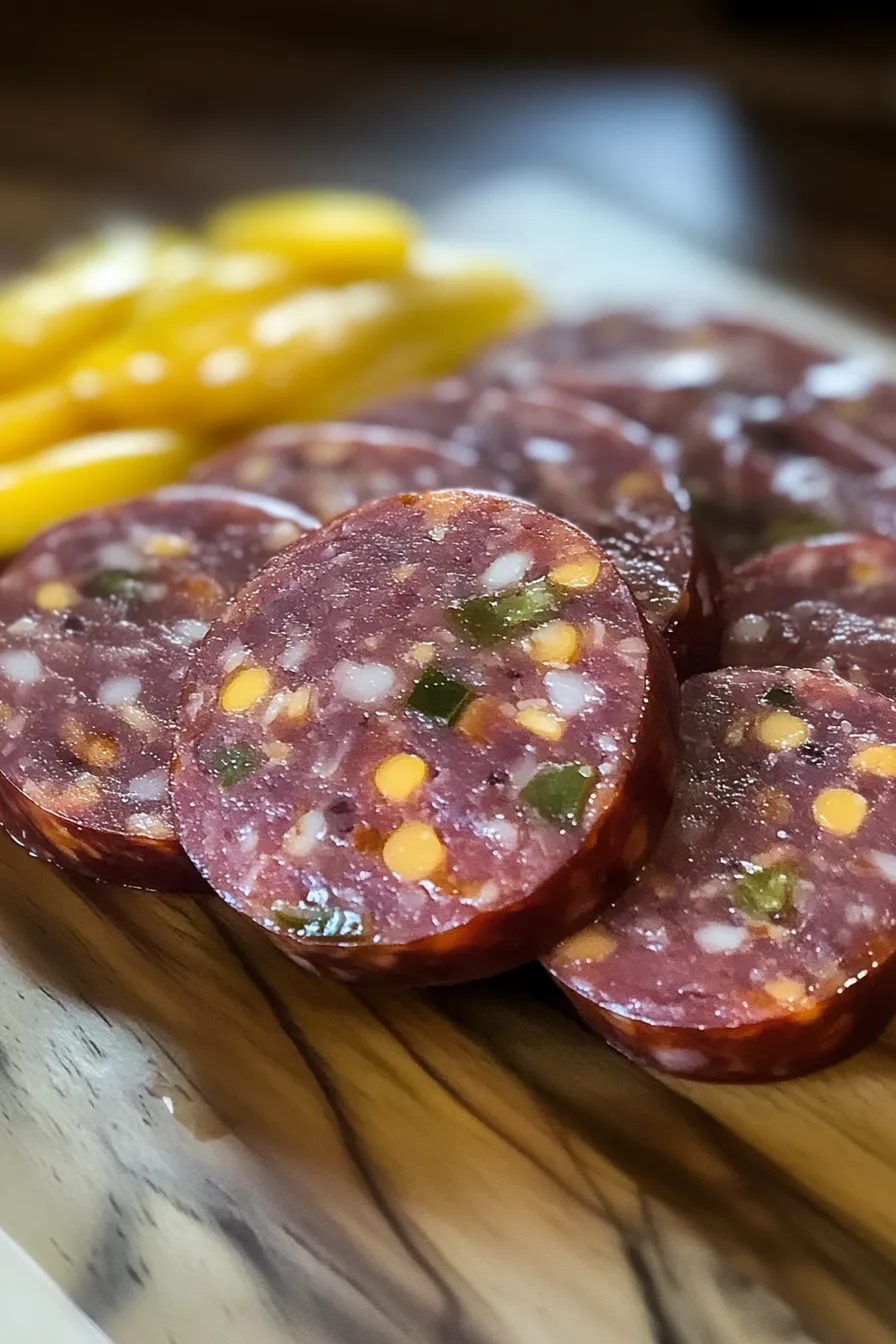 Pin it
Pin it
This venison jalapeño cheddar summer sausage brings wild game to your table in a beautifully seasoned, protein-packed form that's perfect for charcuterie boards or simple snacking. The process transforms humble venison into something truly special with just the right balance of cheese, heat, and savory flavor.
I first made this sausage after a particularly successful hunting season when our freezer was overflowing with venison. Now my hunting buddies specifically request it after every successful hunt, and even my friends who claim not to like game meat devour it without hesitation.
Ingredients
- Ground venison: Forms the lean base with its distinctive but mild game flavor
- Ground pork fat: Provides essential moisture and richness for proper texture
- Shredded cheddar cheese: Creates pockets of creamy tanginess throughout
- Pickled jalapeños: Offer controlled heat and bright acidity
- Curing salt: Preserves the meat safely and gives characteristic pink color
- Garlic powder: Infuses aromatic depth without overwhelming chunks
- Cracked black pepper: Provides classic visual appeal and spice
- Liquid smoke: Delivers authentic flavor when using an oven instead of smoker
- Mustard seeds: Add subtle pops of texture and slight tanginess
- Paprika: Contributes rich color and sweet pepper notes
- Natural hog casings: Create an authentic presentation and proper texture
Step-by-Step Instructions
- Mix the Flavor Base:
- Combine all ground meat, spices, cheese and jalapeños in a large metal bowl. Use clean hands to thoroughly work everything together for at least 5 minutes until the mixture becomes sticky and holds together when squeezed. The proteins in the meat need to be developed through mixing to create proper binding for slicing later.
- Develop Flavor Through Time:
- Cover the mixed meat tightly with plastic wrap pressed directly onto the surface to prevent oxidation. Refrigerate for a full 24 hours to allow the curing salt to properly penetrate the meat and for all flavors to fully integrate. This resting period is critical for food safety and flavor development.
- Prepare Your Casings:
- Flush the natural casings under cool running water to remove any salt preservative. Then soak in warm water for 30 minutes until completely pliable and soft. Run water through the casings to check for holes or tears. This preparation prevents bursting during stuffing and cooking.
- Master the Stuffing Technique:
- Lubricate the stuffing tube with a little water before sliding on the casing. Feed the meat mixture gradually while supporting the filling casing with your other hand. Maintain even pressure to create uniform sausages without air pockets. Leave several inches of empty casing at each end for tying off.
- Ensure Proper Cooking:
- Cook the sausages low and slow at 180°F whether using a smoker or oven. This gradual cooking prevents the cheese from melting out while ensuring the meat reaches the food safe temperature of 155°F internal. Use a digital probe thermometer inserted into the thickest part of the sausage for accuracy.
- Proper Cooling and Storage:
- Allow the finished sausages to cool at room temperature for one hour before refrigerating. This gradual cooling prevents moisture condensation inside packaging. Once completely cooled, wrap tightly in butcher paper or vacuum seal for maximum freshness.
 Pin it
Pin it
The pickled jalapeños are truly the secret ingredient in this recipe. While fresh would seem the obvious choice, the pickling brine adds a tangy brightness that cuts through the richness of the meat and cheese. My grandfather taught me this trick decades ago from his Polish sausage making traditions, and it makes all the difference between good sausage and great sausage.
Balancing Game Flavor
The combination of pork fat with venison serves multiple crucial purposes beyond just adding moisture. The natural sweetness of pork helps balance any potential gaminess in the venison, especially if you're using meat from an older buck taken during the rut. If your venison has particularly strong flavor, consider soaking it in milk overnight before grinding and draining thoroughly. The cheese and spices further mask any wild notes while complementing the natural earthiness of the meat.
Making Without Special Equipment
While a dedicated sausage stuffer produces the most consistent results, you can make this recipe without specialized equipment. A clean kitchen funnel with the narrow end cut to widen the opening works surprisingly well when paired with a wooden dowel as a plunger. Alternatively, you can form the mixture into logs wrapped tightly in plastic wrap, then poach gently before smoking or baking. The texture will be slightly different but the flavor profile remains intact and delicious.
Serving Suggestions
Slice this sausage approximately 1/4 inch thick and serve at room temperature to fully appreciate the flavor complexity. Pair with stone ground mustard, sharp cheddar cheese, and crisp crackers for a traditional presentation. For a more substantial appetizer, layer slices with cream cheese and green onions on rye bread. The sausage also makes excellent additions to breakfast scrambles or diced into rustic stews where its smoky flavor enriches the broth beautifully.
 Pin it
Pin it
Frequently Asked Questions
- → What type of venison works best for this sausage?
Any ground venison will work, but using a lean cut, such as shoulder or leg, is ideal for better consistency.
- → Can I substitute pork fat with another ingredient?
If pork fat isn't available, you can use ground pork shoulder as a substitute without losing flavor or texture.
- → How do I prevent air pockets in the sausages?
Prick the sausages with a sterile pin during the stuffing process to release any trapped air pockets.
- → Can I cook these sausages without a smoker?
Yes, you can bake them in an oven set to 180°F (82°C). They will still achieve a great smoky flavor thanks to the liquid smoke.
- → What’s the best way to store these sausages?
Once cooled, store them in the refrigerator for up to a week, or vacuum-seal and freeze them for several months.
- → What’s the purpose of soaking the casings?
Soaking natural hog casings softens them, making them easier to handle and preventing them from breaking during stuffing.
